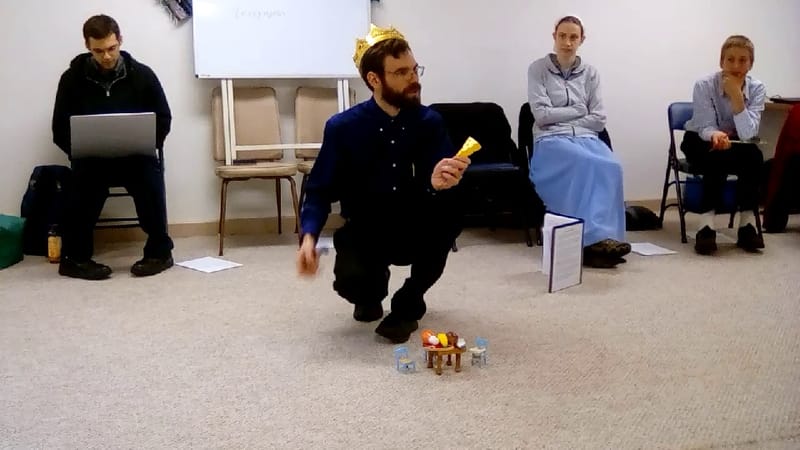In December I had the opportunity to take a two-week Greek immersion class in Pennsylvania. There were about seventeen students and five teachers, depending on how you count. We had lots of fun, with over 4 hours a day of stories, role playing, and dialogue in New Testament Greek!

Since New Years we have been continuing studies with weekly three-hour video conference classes. The main teacher of the course is Joseph Neill. He exhibits considerable knowledge and patience and enhances our learning through good use of technology (Google classroom, Google docs assignments, video recordings of our classes on Zoom, audio excerpts, etc.). I’m really enjoying this opportunity to dig into NT Greek, especially since this program uses some of the same materials that I had selected for self-study several years ago.
For more information about the Biblical Greek Program, including a chance to sign up for the next class, go here: https://biblicalgreekprogram.org/
And to learn more about the “living languages” approach taken by this program, go here: https://www.biblicallanguagecenter.com/why-works/
One of our homework assignments this week is to record ourselves reading part of a story in Greek. We discussed the beginning of the story together in class, then we were each asked to write our own endings.
Here is a video of me reading the entire short story—the first half written by Joseph Neill, and the second half written by me. I must credit the Gospel writers for a couple lines I adapted!
You may notice that the pronunciation sounds different than you expect. The first reason is that, unlike most seminaries, we are following a pronunciation scheme developed by Randall Buth. This scheme is designed to more closely mirror the actual pronunciation of Koine Greek that was used in the time of Jesus. The second reason why my pronunciation may sound different is that my pronunciation, even by this scheme, is still amateur.
Here is the text of the story:
ὁ παῖς ὁ πτωχὸς ἐπείνασεν σφόδρα.
ᾔτησεν οὖν τὸν πλούσιον ἄνθρωπον ἄρτον.
ἐγέλασεν ὁ πλούσιος καὶ προβὰς ὀλίγον ἐξέβαλεν τὸν ἄρτον.
ἰδοῦσα τὸν παῖδα λυπούμενον ἀπέστειλεν γυνὴ δοῦλον αὐτῷ.
Πῶς ἔχεις; εἶπεν ὁ δοῦλος τῷ παιδί.
Κακῶς ἔχω, εἶπεν ὁ παῖς. ἐγώ πεινῶ. θέλω ἰχθύας. ἰχθύας ἔχεις;
Οὐ, ἀλλἀ ὑπάγω ἁλιεύειν, εἶπεν ὁ δοῦλος. Ἀκολούθει μοι καἰ ποιήσω σὲ ἀλιεῦς.
Here’s a rough translation:
A poor child was very hungry.
So he asked a rich man for bread.
The rich man laughed and, going on a little farther, threw away the bread.
Seeing the sad child, a woman sent her servant to him.
“How are you?” [Literally, “How do you have?”] said the servant to the child.
“Not good” [Literally, “I have bad”], said the child. “I am hungry. I want fish. Do you have fish?”
“No, but I am going fishing,” said the servant. “Follow me and I will make you a fisherman.”
Thanks for listening! If you have any questions about the Biblical Greek Program, or any stories about learning biblical languages, share them in the comments below. Blessings!


